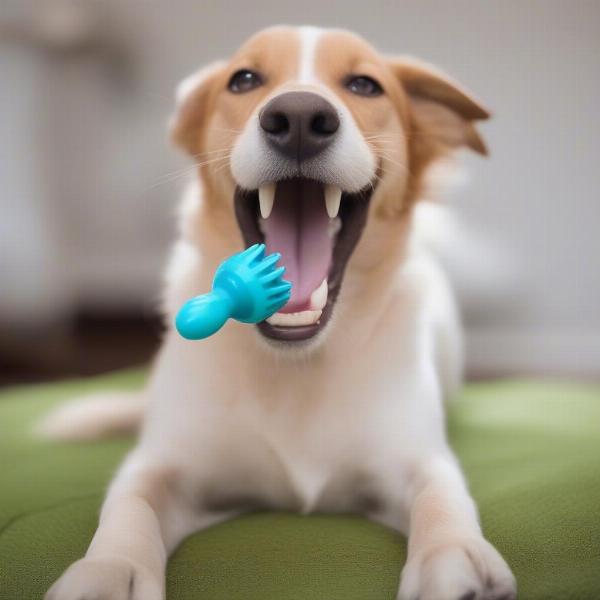Recognizing the subtle signs of discomfort in our canine companions can be challenging. If you’re asking yourself, “How can I tell if my dog has a toothache?”, you’re in the right place. This article will guide you through the common indicators of dental pain in dogs, helping you provide the care they need.
Dental health is crucial for a dog’s overall well-being. Just like humans, dogs can experience toothaches, which can range from mild discomfort to severe pain. Unfortunately, our furry friends can’t tell us when something’s wrong, so it’s essential to be observant and recognize the tell-tale signs. From changes in eating habits to pawing at their mouth, understanding these indicators can help you identify a potential toothache and seek timely veterinary attention.
Common Signs of Toothache in Dogs
Several signs can indicate your dog is experiencing dental pain. These can be subtle, so it’s important to pay close attention to your dog’s behavior.
- Changes in Eating Habits: A dog with a toothache may have difficulty chewing or may drop food while eating. They might also avoid hard food altogether, preferring softer options.
- Pawing at the Mouth: If your dog frequently paws at their mouth or rubs their face against furniture, it could be a sign of oral discomfort.
- Excessive Drooling: While some drooling is normal, excessive drooling, especially if accompanied by blood-tinged saliva, can indicate a dental problem.
- Bad Breath: While not always a sign of a toothache, persistent bad breath can be an indicator of dental disease, which can lead to pain.
- Swollen Gums: Red, inflamed, or bleeding gums are a clear sign of dental issues and potential pain.
- Reluctance to Play: A dog in pain might be less enthusiastic about playing with their favorite toys or engaging in activities they usually enjoy.
- Whining or Whimpering: Vocalizations like whining or whimpering, especially when eating or touching the mouth area, can signal pain.
- Facial Swelling: In some cases, a tooth abscess can cause noticeable swelling on the side of the face.
What to Do if You Suspect Your Dog Has a Toothache
If you notice any of these signs, it’s crucial to take your dog to the veterinarian as soon as possible. Delaying treatment can lead to more serious dental problems and increased pain.
“Early intervention is key when it comes to dental issues in dogs,” says Dr. Emily Carter, DVM. “Addressing a toothache promptly can prevent more serious complications and ensure your dog’s comfort.”
Preventing Dental Issues in Dogs
While not all dental problems are preventable, regular dental care can significantly reduce the risk of toothaches and other dental diseases.
- Brushing Your Dog’s Teeth: Ideally, brush your dog’s teeth daily using a dog-specific toothpaste.
- Dental Chews and Toys: Providing dental chews and toys can help remove plaque and tartar buildup.
- Regular Veterinary Checkups: Schedule regular dental checkups with your veterinarian for professional cleaning and examinations.
“Regular brushing and dental checkups are essential for maintaining your dog’s oral health and preventing painful toothaches,” adds Dr. Sarah Miller, DVM.
Choosing the Right Dental Products for Your Dog
Selecting appropriate dental products can contribute significantly to your dog’s oral health. Look for veterinarian-approved toothpastes and chews designed specifically for dogs. Avoid using human toothpaste, as it can be harmful to dogs.
 Dog Chewing on a Dental Toy
Dog Chewing on a Dental Toy
Conclusion
Recognizing the signs of a toothache in your dog is crucial for their well-being. By being observant and proactive, you can ensure your furry friend receives the necessary care to alleviate their discomfort and maintain optimal dental health. Don’t hesitate to contact your veterinarian if you suspect your dog has a toothache.
FAQ
- How often should I brush my dog’s teeth? Ideally, daily.
- What are the best dental chews for dogs? Consult your veterinarian for recommendations based on your dog’s size and breed.
- Can I use human toothpaste on my dog? No, human toothpaste can be harmful to dogs. Use only dog-specific toothpaste.
- What are the signs of a serious tooth infection in dogs? Facial swelling, loss of appetite, and lethargy can indicate a severe infection.
- How much does a dog dental cleaning cost? The cost varies depending on the location and the extent of the cleaning required.
- Can a toothache affect my dog’s overall health? Yes, untreated dental infections can spread to other parts of the body and cause serious health problems.
- How can I prevent my dog from developing dental problems? Regular brushing, dental chews, and veterinary checkups are key to preventing dental issues.
ILM Dog is a leading international pet website dedicated to providing expert advice and resources on all aspects of dog care and wellbeing. From breed selection and puppy care to senior dog health and training tips, we offer a wealth of information to help you provide the best possible care for your canine companion. We specialize in helping dog owners make informed decisions about their pets’ health, nutrition, training, grooming, and overall care. Our expert advice covers topics ranging from choosing the right dog breed for your lifestyle to understanding the nuances of canine behavior. Contact us today to learn more about our services and how we can help you and your furry friend! Email: [email protected], Phone: +44 20-3965-8624. Visit ILM Dog for all your dog care needs.